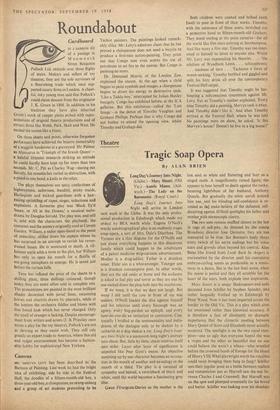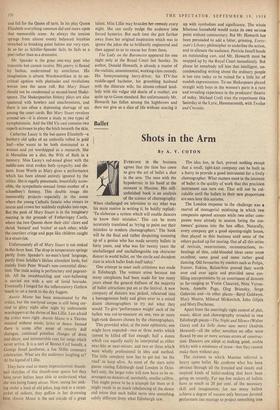Theatre
Tragic Soap Opera
By ALAN BRIEN Long Day's Journey Into Night.
(Globe.)—Mary Stuart. (Old Vic.)—Auntie Mame. (AId- wych.)—The Lady on the Barometer. (Royal Court.) Long Day's Journey Into Night will arrive, in London next week at the Globe. It was the only profes- sional production in Edinburgh which made my ordeal by BEA worth while. Eugene O'Neill's wordy autobiographical play is an endlessly tragic soap-opera, a sort of Mrs. Dale's Diarrhcea. The Tyrones are a thin disguise for the O'Neills and just about everything happens to this disastrous family which could happen to the inhabitants of a patent medicine strip-cartoon advertisement. Mother is a drug-addict. Father is a drunken miser. Elder son is a whoremonger. Younger son is a drunken consumptive poet. In other words, they are the old soaks at home and the audience is asked to feel pity and terror as they are one by one sucked down the plug-hole into the maelstrom.
If we weep, it is that we dare not laugh. But weep I did until the row in front of me was sodden. O'Neill loaded the dice against himself and his relatives until every hiccough was an agony, every beg-pardon an epitaph, and every how-do-you-do an invitation to confession. Con- tinually I bridled at the sentimentality and melo- drama of the dialogue only to be shaken by a catharsis as a dog shakes a rat. Long Day's Jour- ney Into Night is a mammoth long night's journey into chaos. But, little by little, chaos resolves itself into order. Layer after layer of significance is unpeeled like Peer Gynt's onion. An objective summing-up by one character becomes an accusa- tion in the mouth of another and an .eulogy in the mouth of a third. The play is a carousel of sympathy and hatred, a switchback of black and white, until the world becomes a fascinating grey blur.
Gwen Ffrangcon-Davies as the mother is the lost soul as white and fluttering and hurt as a singed moth. A magnificently ruined figure, she appears to beat herself to death against the rocky, beaming lighthbuse of her husband, Anthony Quayle. But gradually the mists unroll around him too, ,and his blinding self-confidence is re- vealed as tI4 make-believe of the defeated, self- deceiving egotist. O'Neill spotlights his father and mother with stereoscopic clarity.
The two sons remain muffled almost to the last in rags of self-pity. As directed by the young Broadway director Jose Quintero, they are too mannered to be true. Ian Bannen's body obeys every twitch of his nerve endings but his voice scars and grovels often beyond his control. Alan Bates (the friend from Look Back In Anger) is marionetted by the director until his convulsive embryo-curling seems as predictable as a move- ment in a dance. But in the last final scene, when the onion is peeled and they all scrabble for the heart bf the tears, both explode into inspiration.
Mary Stuart is a soupy Shakespeare-and-soda decanted from Schiller by Stephen Spender, and rather languidly frothed up in Edinburgh by Peter Wood. Now it has been imported across the border to the Old Vic. This is a play which aims for emotional rather than historical accuracy. It is therefore a fact of absolutely no dramatic importance that the climactic meeting between Mary Queen of Scots and Elizabeth never actually occurred. The spotlight is on the two royal vam- pires—one so ugly that everyone hoped she was a virgin and the other so beautiful that no one could believe she wasn't a whore—who wrestled before the crowned heads of Europe for the blood of Henry VIII. What playwright worth his royalties could resist bringing them fang to fang? Schiller sees their jugular joust as a battle between realism and romanticism just as Marvell saw the war be- tween Charles I and Cromwell. But Marvell was on the spot and plumped eventually for his bread and butter. Schiller was looking over his shoulder and fell for the Queen of tarts. In his play Queen Elizabeth everything common did and mean upon that memorable scene. As always the tension springs from almost evenly balanced loyalties stretched to breaking point before our very eyes. In so far as Schiller-Spender fails, he fails as a poet rather than as a dramatist.
Mr. Spender is the great one-way poet who transmits but cannot receive. His poetry is flawed by bathos, undermined by anticlimax. His imagination is almost Wordsworthian in its un- critical egotism with platitudes and revelations woven into the same roll. But Mary Stuart should not be condemned as second-hand Shake- speare. The Shakespearian history plays are also spattered with howlers and anachronisms, and there is too often a depressing shortage of sex among the court cards. But Mary Stuart revolves around sex—it is almost a study in two types of nymphOmania. And the Old Vic cast contains two superb actresses to play the bitch beneath the skin.
Catherine Lacey is the bat-queen Elizabeth—a leathery old spike of an umbrella rolled in gold leaf—who wants to be both dominated as a woman and yet worshipped as a monarch. She is Messalina on a diet, the Wife of Bath in a nunnery. Miss Lacey's red-nosed ghost with the saddle-sore strut evokes both sympathy and dis- taste. Irene Worth as Mary gives a performance which has been almost entirely ignored by the critics. She is regally pneumatic, beautifully acces- sible, the sympathetic-sensual foster-mother of a schoolboy's fantasy. This double image she memorably projects—especially in the scene where the young Catholic fanatic who swears to rescue and crown her suddenly explodes into rape. But the peak of Mary Stuart is in the imaginary meeting in the grounds of Fotheringay Castle, where the two Queens show their cats' claws and shriek 'bastard' and 'traitor' at each other, while the courtiers cringe and gape like children caught in a street riot.
Unfortunately all of Mary Stuart is not stoked to this fever heat. The drop in temperature springs partly from Spender's no-man's-land language, partly from Schiller's lifeless attendant lords, but mainly from Peter Wood's non-committal direc- tion. The male acting is perfunctory and pageant- ish. All the swashbuckling and view-hallooing is carried out with a sort of timid bravado. Eventually I longed for the inflammatory Guthrie touch to set a torch to the dry faggots.
Auntie Mame has been assassinated by the critics, but the martyred corpse is still being car- ried to glory night after night by enthusiastic worshippers at the shrine of Bea Lillie. I am afraid the critics were right. Auntie Mame is a Thirties musical without music, lyrics or dance. Instead there is scene after scene of smartly dull dialogue, continual poititless changes of dress and decor, and innumerable cues for songs which never arrive. It is a sort of Bennet Cerf benefit, a George Jessel jamboree, a Joe Miller centenary celebration. What are the audiences laughing at? At the legend of Lillie.
They have read so many impressionistic thumb- nail sketches of this thumb-nose queen but they have never before been able to understand what she was being fumy about. Now, seeing her sink- ing under a load of old jokes, hog-tied in a strait- jacket of tedium, they guffaw in her drowning face. Auntie Manic is the sad suicide of a great talent. Miss Lillie may broaden her comedy every night. She can easily nudge the audience into forced hysterics. But each time she gets farther away from her original inspiration which was to ignore the jokes she so brilliantly engineered and then appeal to us to rescue her from them.
The Lady on the Barometer appeared for one night only at the Royal Court last Sunday. Its author, Donald Howarth, is already a master of • the realistic, unsentimental, working-class comedy. His honeymooning lorry-driver, his ITV-fan middle-aged bachelor, his grumbling husband with the illiterate wife, his almost-refined land- lady with the vulgar old dearie of a mother, are quite up to Goon standard. But unfortunately Mr. Howarth has fallen among the highbrows and dare not give us a slice of life without saucing it up with symbolism and significance. The whole hilarious household would make its own serious point without commentary. But Mr. Howarth has been persuaded to add a bitter, grinning, Every- man's Library philosopher to underline the action, and to alienate the audience. Patricia Jessell heads an outstanding cast, and Mr. Howarth must be snapped up by the Royal Court immediately. But please let somebody tell him that intelligent, un- condescending writing about the ordinary people is too rare today to be ruined for a little bit of modish expressionism. To see Shakespeare played straight with boys in the women's parts is a rare and revealing experience in the producers' theatre of today. Michael Croft tries the experiment this Saturday at the Lyric, Hammersmith, with Troilus and Cressida.



































 Previous page
Previous page